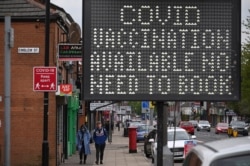Britain lifted many of its coronavirus lockdown restrictions Monday as infection rates fall to their lowest levels since August. Pubs, restaurants, theaters, casinos and art galleries opened their doors to allow customers inside for the first time this year. Many families are now able to meet indoors for the first time in months as the new rules allow gatherings of up to six people inside private homes.
The government credits its rapid vaccination program for allowing the easing of lockdown measures. More than 36 million people — well over half the population — have been given a first dose of one of the approved vaccines as of Monday, and more 20 million have received both doses.
The government, however, has warned that the rapid spread of a new mutation of the virus first seen in India could disrupt plans to end all lockdown restrictions on June 21.
Among the first to take advantage of the relaxed rules were Britons heading off on vacation to Portugal, one of a dozen countries given "green” status by the government due to low infection numbers and high vaccination rates.
Matthew Bolden arrived at Lisbon airport Monday from London. “It is fantastic. The feeling is unbelievable. We’ve got the sun, we got the people, the beaches, the bars. Can't wait,” Bolden said.
Travelers from countries given “amber” status, including most of Europe and the United States, still face mandatory quarantine in the place they are staying for up to 10 days on arrival in Britain.
Several countries have been put on the “red” list, including India, meaning all arrivals must quarantine for 10 days in a government-appointed hotel at a cost of almost $2,500.
Pubs and restaurants across Britain reported brisk trade as many opened for the first time since Christmas. Customers have been allowed in outside gardens and terraces since mid-April, but an unseasonably wet and cold spring has kept many away.
Reopening his Middle East-inspired “Nopi” restaurant in central London for the first time in six months, 36-year-old manager Pierre Malouf said he hopes the lockdowns are gone for good. “I’m nervous, excited, you know there's always a little bit of worry at the back of my head, but that's part of my job, but generally very positive. Everybody is engaged, our colleagues are all engaged, we have a lot of reservations so hopefully this is it from here on,” Malouf said.
Not all Britons were enthusiastic about the relaxation of lockdown rules. “Most people who are going to be going to the pubs are probably the people that are not vaccinated as well, so it does seem a bit risky, but I guess everyone's very desperate to get back out and socialize again,” said London-based boat skipper Adam Garrett.
“It is worrying, yes, it's in the back of my mind. And I wouldn't be surprised if there's another lockdown, quite honestly,” said London actress Gillian Elisa Thomas.
Fueling the concern is the spread of the ‘B.1.617’ mutation of the coronavirus responsible for the surge in cases in India. More than 1,300 infections of the variant have been detected in Britain.
The city of Bolton, near Manchester, is a hotspot of the new variant. The government has deployed mobile vaccination units to the area to try to inoculate as many adults as possible and warns that the spread of the variant could disrupt plans to end all lockdown restrictions next month.
“We're in a race between the vaccination program and the virus, and this new variant has given the virus some extra legs in that race,” British Health Secretary Matt Hancock told reporters Sunday. “But… we have a high degree of confidence that the vaccine will overcome.”
Professor Lawrence Young, a virologist at the University of Warwick, says he is optimistic that the vaccine program will prevent another significant wave of infections.
“All the data indicates that vaccination can prevent severe disease induced by this particular variant,” Young told VOA. “So, whilst this variant may well be able to infect folk, including folk that have already been vaccinated, it doesn’t appear to result in severe disease.”
“But I think the concern is, you know we still have a large proportion of the population unvaccinated, particularly younger people. Younger people have been severely affected actually by this virus in India, so there’s a concern about that.
“We still have pockets of the population in certain regions who are not vaccinated. And so, there is a bit of a concern that this will result in more cases of infection, perhaps a very limited third wave, and the big issue is, is that going to result in more hospitalizations and it really is something we’re going to have to keep an eye on over the next couple of weeks,” Young said.
Several European countries are easing lockdown measures. On the piazzas of Venice and the beaches of Spain’s Costa del Sol, local and international tourists are slowly returning, offering a glimmer of hope for Europe’s battered travel industry. “We hope that we can start again,” said Roberto Menin, an ice cream seller in Venice’s St Mark’s Square. “We can already see tourists during the weekend but during the week it is sad to say that it is very quiet.”
Scientists say the relaxation of rules will inevitably lead to more infections. The question is whether the vaccines are now more potent than the virus, which causes the COVID-19 disease. The United Kingdom currently has 4.4 million confirmed cases and close to 128,000 deaths, according to the Johns Hopkins University, which is tracking infections globally.










